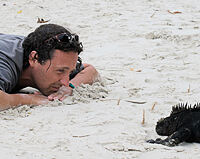
Stéphane Pesant
MARUM – Center for Marine Environmental Sciences
University of Bremen, Germany

MARUM – Center for Marine Environmental Sciences
University of Bremen, Germany
The Centre for Marine Environmental Sciences (MARUM) at the University of Bremen, in collaboration with the Alfred Wegener Institute for Polar and Marine Research (AWI) operates PANGAEA, the Data Publisher for Earth & Environmental Science as a permanent facility. Essential services supplied by PANGAEA are scientific project data management, long-term data archiving, data publication, and data dissemination. Data management includes quality control of metadata and the development of ontologies and vocabularies according to international protocols and standards. PANGAEA holds mandates from ICSU (World Data Centre for Marine Environmental Sciences - WDC-MARE) and WMO (World Radiation Monitoring Center - WRMC).
Dr. Stéphane Pesant is a biological oceanographer. PhD at Laval University, Québec (1999), working on plankton food webs and their associated biogeochemical carbon fluxes. He was scientific advisor for Marine Ecosystem Health and assistant to Jake Rice (stock assessments) at the Department of Fisheries & Oceans Canada, Ottawa (2000-01); Postdoc at the University of Western Australia, Perth (2002-04); and assistant to the Scientific Director of FP6-NoE-Eur-OCEANS, Villefranche/Mer (2005-09) for which he coordinated data integration in close collaboration with WDC-MARE / PANGAEA®. Since 2009, he joined PANGAEA and is involved in the integration of scientific data for several European, national and international projects, including EUR-OCEANS, EuroMarine, Tara Oceans, CoralFISH, EuroBASIN, MicroB3, EPOCA, BioAcid and MedSeA.
The scientific activities of the Tara Oceans expedition, led by EMBL senior scientist Eric Karsenti, present an unprecedented effort that resulted in 35,000 samples containing millions of small organism collected in more than 210 ocean stations, chosen for their climatic significance or biodiversity.